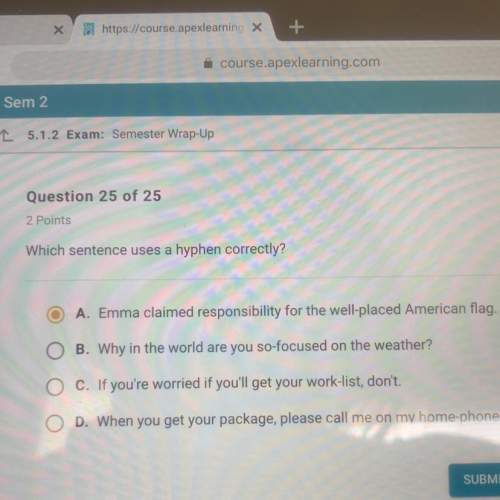Letter to a Citizen of Kentucky, an excerpt
Executive Mansion, Washington,
April 4, 1864...

English, 28.05.2020 02:01 kobrien9146
Letter to a Citizen of Kentucky, an excerpt
Executive Mansion, Washington,
April 4, 1864.
A. G. Hodges, Esq., Frankfort, Ky.
My Dear Sir:
You ask me to put in writing the substance of what I verbally stated the other day, in your presence, to Governor Bramlette and Senator Dixon. It was about as follows:
I am naturally anti-slavery. If slavery is not wrong nothing is wrong. I cannot remember when I did not so think and feel; and yet I have never understood that the Presidency conferred upon me an unrestricted right to act officially in this judgment and feeling. It was in the oath I took that I would to the best of my ability preserve, protect and defend the Constitution of the United States. I could not take the office without taking the oath. Nor was it in my view that I might take the oath to get power, and break the oath in using the power.
I understood, too, that in ordinary civil administration this oath even forbade me to practically indulge my primary abstract judgment on the moral question of slavery. I had publicly declared this many times and in many ways; and I aver that, to this day I have done no official act in mere deference to my abstract judgment and feeling on slavery. I did understand, however, that my oath to preserve the Constitution to the best of my ability imposed upon me the duty of preserving, by every indispensable means, that government, that nation, of which that Constitution was the organic law. Was it possible to lose the nation, and yet preserve the Constitution?
By general law, life and limb must be protected; yet often a limb must be amputated to save a life, but a life is never wisely given to save a limb. I felt that measures, otherwise unconstitutional, might become lawful by becoming indispensable to the preservation of the Constitution through the preservation of the nation. Right or wrong, I assumed this ground, and now avow it. I could not feel that to the best of my ability I had even tried to preserve the Constitution, if, to save slavery, or any minor matter, I should permit the wreck of government, country, and Constitution altogether.
When, early in the war, General Fremont attempted military emancipation, I forbade it, because I did not then think it an indispensable necessity. When, a little later, General Cameron, then Secretary of War, suggested the arming of the blacks, I objected, because I did not yet think it an indispensable necessity. When, still later, General Hunter attempted military emancipation, I forbade it, because I did not yet think the indispensable necessity had come. When, in March and May and July, 1862, I made earnest and successive appeals to the Border States to favor compensated emancipation, I believed the indispensable necessity for military emancipation and arming the blacks would come, unless averted by that measure. They declined the proposition; and I was, in my best judgment, driven to the alternative of either surrendering the Union, and with it the Constitution, or of laying strong hand upon the colored element. I chose the latter. In choosing it, I hoped for greater gain than loss; but of this I was not entirely confident...
Yours truly,
A. Lincoln
Use context to determine the meaning of the words in bold.
(4 points)
Group of answer choices
I made a few angry gestures.
I made several heartfelt requests.
I made two unenthusiastic attempts.
I made old-fashioned decisions.

Answers: 3
Another question on English

English, 21.06.2019 19:00
Read this excerpt from white fang by jack london. the qualities in his kind that in the beginning made it possible for them to come in to the fires of men, were qualities capable of development. they were developing in him, and the camp-life, replete with misery as it was, was secretly endearing itself to him all the time. but white fang was unaware of it. he knew only grief for the loss of kiche, hope for her return, and a hungry yearning for the free life that had been his. which quotation from the paragraph supports the story’s theme of homesickness? “the camp life . . was secretly endearing itself to him all the time.” “but white fang was unaware of it.” “he knew only . . a hungry yearning for the free life that had been his.” “the qualities in his kind . . were qualities capable of development.”
Answers: 1

English, 22.06.2019 01:00
Pls excerpted from "hope is the thing with feathers" by emily dickinson [2] and sweetest—in the gale—is heard— and sore must be the storm— that could abash the little bird that kept so many warm— [3] i've heard it in the chillest land— and on the strangest sea— yet, never, in extremity, it asked a crumb—of me. in the last stanza, the author writes that the little bird “never … asked a crumb of me.” which type of figurative language is evident in these lines? a. onomatopoeia b. alliteration c. assonance d. personification
Answers: 2

English, 22.06.2019 01:30
Read this excerpt from edgar allen poe the masque of the red death and answer the question that follows.what kind of writing does the excerpt represent? here the case was very diffierent,as might have been expected from the dukes love
Answers: 1

English, 22.06.2019 04:00
How does the author characterize theseus in the story? cite evidence from the text in your response
Answers: 2
You know the right answer?
Questions



English, 30.03.2021 01:00

Mathematics, 30.03.2021 01:00

History, 30.03.2021 01:00

English, 30.03.2021 01:00


Mathematics, 30.03.2021 01:00

Health, 30.03.2021 01:00

Health, 30.03.2021 01:00



Geography, 30.03.2021 01:00

Mathematics, 30.03.2021 01:00

Chemistry, 30.03.2021 01:00



Mathematics, 30.03.2021 01:00






